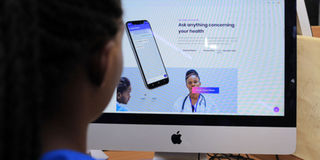We need the will to use tech to save lives

Telehealth uses ICT for the exchange of information for the diagnosis and treatment of diseases and injuries, research and evaluation, and for the continuing education of health professionals.
Distance, cost, quality, and time prevent people from accessing quality health, and they die every day. These are the same barriers that technology is well-suited to overcome, and Kenya exemplifies the region's efficient use of technology.
It is unacceptable that so many people are dying from preventable diseases when we have the technology available to connect them with the help they need.
Telehealth or telemedicine digitally links you with your doctor and bridges distance. It allows your doctor to provide care to you without seeing you in person. Generally, telehealth is done online through your computer, tablet, or smartphone with the help of an internet connection. Many homes have at least one of these devices, complete with internet access.
Consultation by phone
In practice, you can conduct medical consultations by phone or video chat. Doctors can send messages to you by email, secure messaging, or through secure messaging. Your doctor can also monitor your condition remotely while you are at home.
Your doctor may need your vital signs to stay informed on your progress. Therefore, you may need basic medical equipment such as a thermometer, weighing scale, and blood pressure monitor to take your vital signs.
Telemedicine simplifies hospital management. It is possible, for example, to digitally link health facilities lacking specialists, medicines, or equipment with those that have better resources.
With a camera installed on both the medical specialist's side and another in the patient's room, a specialist can remotely diagnose and prescribe treatment for many health conditions. The patient saves time and money and gets premium health services.
Outdated means
Almost everyone in Kenya carries a phone, and smartphones are becoming increasingly common. Thus, it is inexcusable for a country with a record-breaking mobile money transfer system to still rely on outdated and ineffective means to access health services. Just like mobile money service is accessible in every corner of the country, so can preventive and curative health services be.
In counties, why, for example, do some hospitals report running out of essential medicines while others keep discarding expired ones?
If medical facilities in a county are connected electronically, and their stocks of supplies are updated in real-time, health providers can see which facilities have medicine needed by their patients. Instead of sending them home to look for drugs on their own, they can electronically order them.
For telemedicine to flourish, a lot needs to be done and done urgently. There are thousands of patients travelling abroad for treatment every day, so it is imperative that this be done as soon as possible. These foreign trips are expensive, and most local insurance companies do not cover the treatment costs.
A healthy population is a key to a nation's prosperity. We have the tools and technologies to save lives, but do we have the will to use them?
Mr Wambugu is an informatician. Email: [email protected]. Twitter: @Samwambugu2





